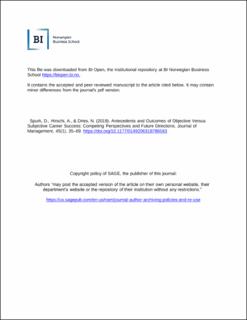| dc.description.abstract | This review examines competing perspectives relating to (a) the range and prevalence of different theoretical approaches to the study of career success and (b) the need for a theoretically differentiated understanding of the antecedents of objective career success (OCS) versus subjective career success (SCS). Furthermore, the review complements the assumption that OCS and SCS are only ultimate outcomes of careers, proposing instead that career success also acts as an antecedent to other career and life outcomes. Against the backdrop of an organizing resource management framework, we present and critically evaluate the results of a systematic analysis of the theoretical approaches used to empirically study the antecedents of OCS and SCS. Furthermore, we develop a taxonomy of outcomes of career success. Our review findings show a theoretical heterogeneity with some dominant theoretical approaches within research of antecedents of career success. Moreover, past research started to adopt different theoretical approaches when predicting OCS (e.g., approaches focusing on personal resources, such as human capital or [competitive] performance) versus SCS (e.g., approaches focusing on personal key resources, such as stable traits). Several types of career success outcomes were identified: withdrawal, career attitudes, health and well-being, reactions from the (work) environment, and self-concept. On the basis of these findings, we provide recommendations for how future research can make sense of the theoretical heterogeneity in career success research, how research on antecedents and outcomes can better account for the OCS/SCS distinction, and how future research can more rigorously integrate research on antecedents and outcomes of career success. | en_US |
